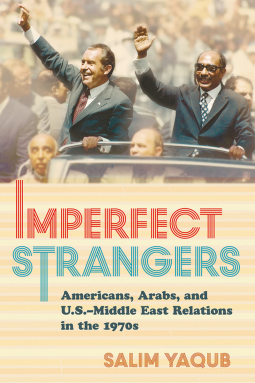
Imperfect Strangers
Americans, Arabs, and U.S.–Middle East Relations in the 1970s
by Salim Yaqub
This title was previously available on NetGalley and is now archived.
Send NetGalley books directly to your Kindle or Kindle app
1
To read on a Kindle or Kindle app, please add kindle@netgalley.com as an approved email address to receive files in your Amazon account. Click here for step-by-step instructions.
2
Also find your Kindle email address within your Amazon account, and enter it here.
Pub Date Aug 10 2016 | Archive Date Oct 20 2016
Description
In Imperfect Strangers, Salim Yaqub argues that the 1970s were a pivotal decade for U.S.-Arab relations, whether at the upper levels of diplomacy, in street-level interactions, or in the realm of the imagination. In those years, Americans and Arabs came to know each other as never before. With Western Europe’s imperial legacy fading in the Middle East, American commerce and investment spread throughout the Arab world. The United States strengthened its strategic ties to some Arab states, even as it drew closer to Israel. Maneuvering Moscow to the sidelines, Washington placed itself at the center of Arab-Israeli diplomacy. Meanwhile, the rise of international terrorism, the Arab oil embargo and related increases in the price of oil, and expanding immigration from the Middle East forced Americans to pay closer attention to the Arab world.
Yaqub combines insights from diplomatic, political, cultural, and immigration history to chronicle the activities of a wide array of American and Arab actors—political leaders, diplomats, warriors, activists, scholars, businesspeople, novelists, and others. He shows that growing interdependence raised hopes for a broad political accommodation between the two societies. Yet a series of disruptions in the second half of the decade thwarted such prospects. Arabs recoiled from a U.S.-brokered peace process that fortified Israel’s occupation of Arab land. Americans grew increasingly resentful of Arab oil pressures, attitudes dovetailing with broader anti-Muslim sentiments aroused by the Iranian hostage crisis. At the same time, elements of the U.S. intelligentsia became more respectful of Arab perspectives as a newly assertive Arab American community emerged into political life. These patterns left a contradictory legacy of estrangement and accommodation that continued in later decades and remains with us today.
A Note From the Publisher
Salim Yaqub is Associate Professor of History at the University of California, Santa Barbara. He is the author of Containing Arab Nationalism: The Eisenhower Doctrine and the Middle East.
Advance Praise
"Salim Yaqub has written a sophisticated overview of U.S.-Arab relations during that pivotal decade, the 1970s. Deftly, he examines both American foreign policy during that critical era and how Arab Americans responded to their government's shifting positions. Given current concerns about ISIS, international terrorism, the fraught politics of the Middle East, and the heated rhetoric and high stakes surrounding the status of people of Arab descent in the United States as well as in Europe, Yaqub’s rich and compelling work could not be more relevant."—David Farber, Roy A. Roberts Distinguished Professor of History, University of Kansas, author of Taken Hostage: The Iran Hostage Crisis and America’s First Encounter with Radical Islam
"Salim Yaqub's Imperfect Strangers makes a compelling case that the Nixon, Ford, and Carter years marked a watershed in U.S. relations with the Arab world. During the 1970s, the United States emerged as the chief interlocutor in the Arab-Israeli peace process at precisely the moment when the Arab states were becoming more polarized than ever between moderates and radicals. Meanwhile, Arab Americans were becoming a force to be reckoned with inside the United States, not only as outspoken critics of America's special relationship with Israel but also as increasingly well-organized opponents of what today we would call Islamophobia. By the end of the decade, these trends produced a truly ironic situation: reciprocal hostility between the United States and the radical Arab states on one hand and greater acceptance of Arab Americans by the U.S. public and mainstream media on the other."—Douglas Little, Clark University, author of Us versus Them: The United States, Radical Islam, and the Rise of the Green Threat
Available Editions
| EDITION | Other Format |
| ISBN | 9780801448836 |
| PRICE | $35.00 (USD) |



